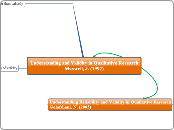Understanding and Validity in Qualitative Research Maxwell, J. (1992)
Goal: Understanding rather than valididy
Types of validity
Descriptive
Also called reportage or primary understanding
Capturing the activites, actions and behaviors as they occur instead of the meaning these have for the actors.
Secondary Validity
Includes inferences about the physical observation
Reliability - a kind of threat to validity
Different observes or methods produce different descriptions of the same phenomenon
Solved if observers agree on their descriptive accuracy
solved by acerting the differeces were due to obsever's different pespectives and purposes
Not independent from theory
Includes the numerical description of the object under study- like descriptive stats
Interpretive
understands phenomena from a emic rather than etic perspective. - meaning given by the actors
Grounded on the accounts of people under study - rely on people's words and concepts
Theorethical
Accoung functions as an explanation as well as description and interpretation of the phenomena
Macthes the idea of construct validity
Generazability or external validity
Different from quantitative research. It is meant to theory building.
Two aspects
Generalizing within the community. groups, or institutions studied to persons, events and settings that were not directly observed or interviwed.
Generalizing to other communities. groups or institutions
Internal validity is more important
Evaluative Valididy
Understanding Reliability and Validity in Qualitative ResearchGolafshani, N. (2003)
Quantitative resesearch
Grounded on positivistic assumptions
the world is made up of observable and measurable facts
Validity
Goals: Determine whether the research measures what it was designed for or how truthfull the results are.
Reliability
Results are consistent over time or if the results could be reprocuded under a similar methodology
3 types
Measure administered repetedly remain the same
Using test -retest methods at different times
Goal: Produces findings arrived from real world enviroment where phenomena unfolds slowly . Seek understanding,ilumination, and extrapolation to similar situations
Similarity of measurement within a given time period
Stability of measurement over time
Qualitative Research
Seeks to understand"Naturalistic" phenomena in its real world settings
Reliability
Examination of trustworthiness crucila
Validity
The researcher is the instrument
Other adopted concepts
Quality
Rigor
Trustwealthiness
Triangulation
Proven method to improve validity and reliability of research
Engaging multiple methods of data collection and analysis: Observations, interviews, recordings,
